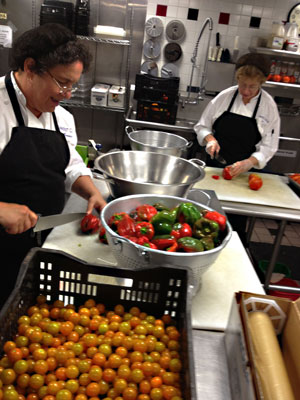by William Sweet
How local is locally-grown produce? At Amherst College it means you can barely break a sweat walking to where your salad came from.
This fall, the Book & Plow Farm began supplying Dining Services wth the fruits --and vegetables-- of its first harvest.
Farmers Peter McLean and Tobin Porter-Brown, with the help of students and other volunteers, kicked off the school year with a ton of watermelon, hundreds of pounds of kale, mustard, bok choi and tot soi, and pounds and pounds of tomatoes. Dining Services is also using carrots, onions, summer squashes and herbs from the farm.
Early this year, the college signed a lease with the pair to establish a farm that supplies Dining Services with produce. The for-profit operation sells crops to a few other customers, including some local restaurants and Hampshire College, but Amherst College is by far the largest customer and plays a large role in deciding what gets planted.

“It’s a beautiful product,” said the college's Executive Chef Jeremy Roush. “They've been blessed with the right weather this year. The tomatoes have been like candy.”
Those involved say it’s been the beginning of a beautiful friendship, but a relationship which requires some flexibility and creativity, largely because the academic and agricultural years run practically on opposite schedules: Valentine Dining Hall shuts down for its big pre-Orientation cleaning just when harvest season is going gangbusters.
“We’re trying to extend the season in both directions as far as possible,” said McLean. “We’re trying to deliver food as far into December as we can, by growing things under plastic in the greenhouse, and we are going to plant some things in the fall that we know we won't be able to harvest until the spring.”
What the kitchen staff have not cooked up in a given week has been prepped and preserved for the weeks and months ahead. Which is the paradox: all this effort to go fresher has resulted in the top chef’s having to come up with more ways to preserve all that produce.
“When 200 pounds of kale comes in, you gotta do something with it,” said salad worker Bernadette Lynch, de-seeding a batch of the farm’s peppers. Rather than let pounds and pounds of basil, cilantro and dill go bad, they got prepping.
“The basil we preserved in olive oil, similar to a pesto; [with] the fresh dill we made a compound butter. Other herbs we dried over salt and infused the salt to make ‘herb salt’ for seasoning roasts and other items,” Roush said. “With tomatoes we made a classic puree to serve as a foundation for multiple other tomato-based sauces.”
All in all, they’ve prepared and frozen some 400 pounds of kale. They also blanched the braising greens and froze them to use as soup stock for the winter.
“Jeremy’s been really creative at how to extend the produce as long as possible,” said McLean. “On our end, we are growing frost-tolerant and hardy plants for the winter months.”
“This is the inaugural year, so obviously it's a very experimental year,” Roush said. “We are learning a great deal, working with new products, such as Komatsuna and Hakurei turnips. … This is a very exciting time for a chef.”

There are products they won’t take, where good intentions run up against the fact that thousands of meals are served every day at Val. Garlic, because of the sheer volume in which it is used, still has to be bought peeled and chopped. Butternut squash, because it is labor-intensive to prepare, is purchased from larger farms in the Pioneer Valley.
McLean said the farm relies on the support of volunteers and student interns, who came out even during the blistering heat wave this summer. “These guys are great: super-spirited and super motivated. It didn’t matter how hot it was, they were up for it. We just bought the crew more popsicles.”
After all, Amherst students made this happen. A student group first approached the college’s administration in 2010 with the farm proposal. This grew into a committee of students, faculty and staff who solicited proposals from farmers wishing to lease land with “the dual goals of raising local produce and conducting educational and research programs that involve the entire College.” About a dozen farmers submitted proposals, and McLean and Porter-Brown were the top the choice.
“I think the Book & Plow Farm is a great addition to what Amherst College already provides our students and community in the area of academics, social life and real-life experiences,” said Charles Thompson, director of dining services. “As for the dining program: we’ve long been a big supporter of local businesses and sustainable goods, so having our own farm on campus is about as good as it gets.”
Sure, sometimes the tomatoes are lumpy, and sometimes the red peppers are green. For those involved, supporting sustainability is worth some less-than-picture-perfect fruits and vegetables. For Roush, though, it all comes down to flavor.
“Some of the tomatoes that we had were not the prettiest, but what are you giving up? You might be giving up that polished pink-looking thing that is hard as a rock, for something that is rich, red, and juicy. The watermelon that we served for Orientation luncheon had some scarring on the rind, but once you cut it into wedges, you didn't have to worry about it, because the taste of it was so fantastic and so juicy. It’s just what it should be.”